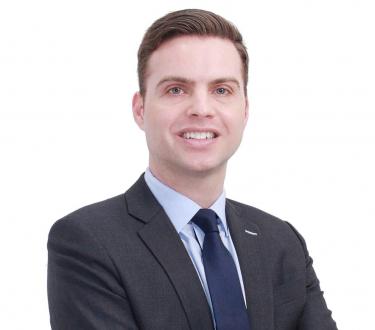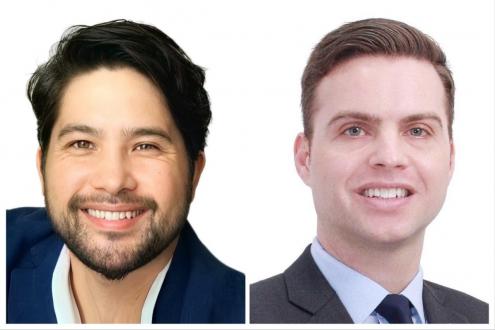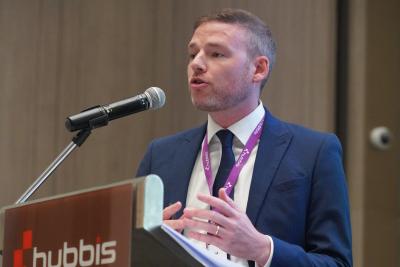Henley & Partners on Investment Migration, Residency & Citizenship – Opportunities and Trends

Emile de Marsac of Henley & Partners
Jun 17, 2022
Alternative residences or citizenships have become very popular amongst wealthy clients in the past decade and even more so since the pandemic hit and during times of geopolitical uncertainties. Domicile diversification has become almost a new asset class. Emile de Marsac and Thomas Wong, both Business Development Managers in the Bangkok office of investment migration consultancy Henley & Partners, gave delegates their insights in an interesting presentation on these topics at the Hubbis Thailand Wealth Management Forum on May 25 in Bangkok. They explained why the demand for these alternative residences or citizenships continues to grow. They outlined why clients consider domicile diversification as a new element of astute estate and wealth planning for HNWI and UHNW clients. And they told delegates how this can be achieved, and how it can often be aligned to real estate investment overseas on many of the investment migration programmes.
Henley & Partners has championed the investment migration industry for more than two decades. The firm has grown rapidly in the past five years, particularly since the start of the pandemic. Henley has expanded its global footprint fairly aggressively, with 35 offices globally today, and plans to open another 5 additional offices this year, including new offices in the Middle East, Africa and North & Latin America. The firm set out on this journey back in the 1990s, and they have advised more than 20,000 clients to date.
Henley’s two core activities
The firm has two core businesses, one, advising private clients on their options and then helping them execute. The second component is advising government on the inward investment migration programmes.
In the world of private client advice, Henley works closely with the wealth management industry and associated professions. The firm’s advisors are in constant liaison with private bankers, private client lawyers, financial advisors, IAMs, tax advisors, corporates, fiduciary companies, and other high-net-worth businesses.
Working with the wealth industry
They then work on a fee share arrangement and constantly reiterate how wealth market incumbents can rest assured that Henley is a totally benign partner, never going anywhere near any clients for investment advisory and instead focusing entirely and exclusively on investment migration. Moreover, they can often also reciprocate referrals to business partners as they have a major global client base and extensive geographical coverage.
As to how Henley works with its intermediary partners, there are two primary models. One option is a fee-sharing model for successful client referrals. The other – and this is becoming more prevalent – is the reciprocal referral basis, which works particularly well in the major financial centres worldwide.
How strong is your passport?
Armed with an excellent slide presentation, Thomas first pointed to the well-known Henley Global passport index, which they release every year, and is updated quarterly. He explained that Japan and Singapore lead the global list, with visa-free access to 192 countries around the world. At the very end of the list come countries such as Afghanistan and Syria. Thailand, he reported, is currently ranked number 66, roughly in the middle of the pack with China and Saudi Arabia.
Thomas explained that there are more than 100 different options for citizenship or residency by investment around the world, but that Henley has narrowed that down to roughly 30 to 40 programmes, in Europe, the Caribbean, and the usual mainstream destinations such as the US, the UK, and Australia. He pointed also to programmes in Asia, including Singapore, Thailand and Malaysia.
A world of choice
In Europe, he highlighted countries such as Cyprus, Greece, Italy, Malta, and Portugal, all very popular programmes right now for residency by investment for Henley clients. In the Caribbean, Henley currently focuses on five key programmes, including Grenada and St. Lucia, for example.
He explained a benefit of the Caribbean was their price and the speed of applications. “A single applicant would be able to achieve citizenship in some of these countries starting with a minimum investment of USD 100,000,” he reported. “And it is important to note is all of these Caribbean countries offer Schengen visa access, which is visa-free access to all the European countries that are part of that treaty.”
In Europe, he explained, pricing for EU access can range from relatively low levels for countries such as Greece to very high entry levels and requirements, such as Austria – often seen as the crown jewel of countries – for its remarkable infrastructure and quality of life. Malta, Cyprus and Portugal are other popular programmes that are available at somewhat lower costs.
Key motivations
Thomas handed the floor to Emile, who offered more background on client motivations, explaining that domicile diversification centres around the concept of not putting all your eggs in one basket.
“Recent disruptors of COVID-19 and climate change have become key drivers of interest in investment migration,” he reported. “And this year, global volatility has reached new heights with the ongoing war in Ukraine.”
He said the general lack of certainty has led many high-net-worth individuals to reassess their situation and circumstances, leading them to see the increasing appeal of residence and citizenship by investment programmes as a hedge against country-specific risk, which includes poor health security, increase in taxation, and changes in government policies.
Domicile diversification
“These programmes enable individuals and families to safeguard their futures and due to the optionality that they provide,” he elaborated, “holding multiple residences and citizenships allows individuals to overcome restrictions and limitations of their countries of origin while facilitating access to world-class healthcare, education, and business and career options in stable and secure environments.”
“Diversifying your wealth and lifestyle portfolios by investing in a selection of residence options enhances your family's global mobility and is an excellent insurance policy against ongoing political and economic upheaval,” he explained. “It also functions as an intergenerational legacy planning tool to prepare and future proof your family for generations to come, by providing them with access to multiple countries around the world.”
Facilitating generational diversity
Moreover, residence and citizenship by investment programmes offer multiple solutions for large multi-generational families that do not necessarily need to all be in the same location.
He also highlighted some key drivers for alternative residences, such as improved quality of life through access to world-class health care systems, leading schools and universities, and efficient transportation systems. Some may be incentivised by the prospect of moving from higher to lower tax jurisdictions. While others may find that other countries offer greater personal security and privacy.
And of course, there are also the advantages of different passports if the clients choose the citizenship options. Emile told delegates that such options appeal for additional reasons including lifestyle benefits, retirement freedom, greater global travel mobility, optional expatriation, and estate and legacy planning. Climate change may also be another reason, for example, clients based in a region threatened by the impact of global warming seeking climate resilient countries. Additionally, he explained that citizenship is one of the tiebreaker rules in double tax treaties between countries.
Scanning the globe
Emile also scanned the globe, zooming in on certain markets. He reported that golden visas are becoming increasingly popular amongst, for example, British citizens, targeting locations such as Portugal, Greece, Spain, and Italy, as great retirement destinations. Henley helps many clients with these applications, and many are achievable through real estate investment, with residence then often a pathway to citizenship.
He said they are also seeing an increasing number of wealthy Americans looking for second passports as a hedge against changes in fiscal policy in the future. For example, he reported that many wealthy Americans are seeking out Caribbean passports so that should they so wish at any stage, they have the option of renouncing US citizenship.
Wealthy Indians are highly active and enjoy access to countries with excellent education for their children, top-class healthcare facilities, and easier travel, especially if there were to be another major pandemic. Indian clients are becoming increasingly global in their reach, and their family members are often dispersed across the globe. Canada, for example, is also a very popular choice amongst high-net-worth individuals of any origin when it comes to health security.
Growth aplenty ahead
“We see strong growth ahead in demand from countries such as China and India, and although they have restrictions on dual citizenship, residence by investment programmes have proven to be particularly popular with them in locations such as Europe, the US, Canada, Australia, and the UK,” Emile reported.
Thomas then offered delegates insights into a report that Henley worked on in partnership with Deep Knowledge Analytics to create the Best Investment Migration Real Estate Index.
Aligning migration diversification and investment
“This is a comprehensive look at the top 16 countries in the world that have a real estate component to their citizenship or residency programme,” he explained.
“These countries are all actively seeking high net worth individuals and families who are looking to pair their real estate investment with residency or citizenship which many clients would like to do but don't necessarily know that that is an option for them.”
He explained the parameters include elements such as GDP, quality of life, saleability of the asset, and the overall real estate market in these countries. He highlighted key markets such as the UAE, Spain, Montenegro, Turkey, Portugal, and Thailand, which has a real estate component to its residency option. He noted that all five of the Caribbean citizenship programmes are on the list as well.
A perfect match
“Why are investors looking for real estate in foreign jurisdictions as part of this residence or citizenship diversification?” he pondered. “Well, it is simply for access to a stable asset class overall, access to stable currency through rental income, or to increase their quality of life. They are looking to possibly have a vacation home for themselves or their extended family or a retirement home for the future. In all these cases, there is enormous potential for pairing investment in real estate and lifestyle with the potential for the residency or citizenship components, and all the advantages we have highlighted that come with those.”

Associate Director Private Clients at Henley & Partners
More from Emile de Marsac, Henley & Partners
Latest Articles






